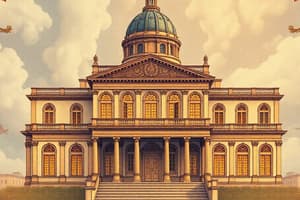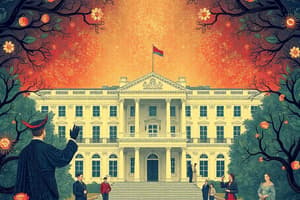Podcast
Questions and Answers
Who have been the most recent presidents? (Select all that apply)
Who have been the most recent presidents? (Select all that apply)
- Ollie North
- George H.W. Bush (correct)
- Ronald Reagan (correct)
- Barack Obama (correct)
What are the powers of the president?
What are the powers of the president?
The formal sources of presidential power laid out in Article II of the Constitution.
What powers does the president have? (Select all that apply)
What powers does the president have? (Select all that apply)
- To veto legislation (correct)
- To pardon felons (correct)
- To declare war
- To propose legislation to Congress (correct)
What is the power to propose legislation?
What is the power to propose legislation?
What are some recent examples of proposed legislation? (Select all that apply)
What are some recent examples of proposed legislation? (Select all that apply)
How does the president submit the budget to Congress?
How does the president submit the budget to Congress?
What is meant by signing legislation?
What is meant by signing legislation?
What is a regular veto?
What is a regular veto?
To veto a bill, the president must veto the whole bill, not just parts of it. ______ or False?
To veto a bill, the president must veto the whole bill, not just parts of it. ______ or False?
What happens if the president vetoes a bill?
What happens if the president vetoes a bill?
What are some examples of recent vetoes?
What are some examples of recent vetoes?
Flashcards are hidden until you start studying
Study Notes
Recent Presidents
- Ronald Reagan (Republican) served from 1981-1989.
- George H.W. Bush (Republican) served from 1989-1993.
- Bill Clinton (Democrat) served from 1993-2001.
- George W. Bush (Republican) served from 2001-2009.
- Barack Obama (Democrat) has served since 2009.
Powers of the President
- Presidential powers are outlined in Article II of the Constitution.
- These powers have been held by all U.S. presidents, starting with George Washington.
- Formal sources of power include legislative, executive, and military functions.
Specific Presidential Powers
- Propose legislation to Congress.
- Submit the annual federal budget to Congress.
- Sign or veto legislation passed by Congress.
- Serve as chief executive and nominate officials and federal judges.
- Act as commander-in-chief of the military.
- Negotiate treaties and grant pardons to felons.
Proposing Legislation
- The president proposes legislation primarily during the annual State of the Union Address each January.
- Proposals can also be made through public statements or events at any time.
Recent Legislative Initiatives
- Notable initiatives by Barack Obama include:
- Healthcare reform.
- Wall Street regulation reform.
- Credit card regulation reform.
Submitting the Budget
- The Office of Management and Budget prepares the federal budget for the president.
- The submission to Congress often leads to lengthy negotiations, especially between different parties.
Signing Legislation
- After passing Congress, bills are submitted to the president, who can either sign or refuse them.
- Signing into law allows the president to take credit for the legislation.
Regular Veto
- Regular vetoes are frequently used by presidents as a bargaining tool.
- From George Washington to George W. Bush, fewer than 1,500 regular vetoes have been issued, with a success rate of 93%.
- George W. Bush's veto success rate was approximately 64%, the third lowest among presidents.
Veto Process
- To veto a bill, the president must reject the entire bill and return it to the originating house within ten working days.
- A veto message must accompany the bill, detailing the objections.
Consequences of a Veto
- Congress can either do nothing or attempt to override the veto, requiring a two-thirds majority in both houses.
- It is challenging to achieve the needed majority, making it politically risky for presidents to veto bills.
Recent Veto Examples
- George W. Bush vetoed the Child's Health Insurance Bill on 12/12/2007; the House failed to override with a two-thirds majority.
- Another veto by Bush was of the Food Conservation/Energy Bill, which also did not succeed in an override attempt.
Studying That Suits You
Use AI to generate personalized quizzes and flashcards to suit your learning preferences.




